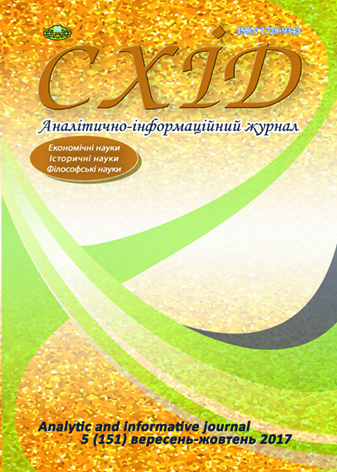Notion of religion and God in John Dewey's philosophy
DOI:
https://doi.org/10.21847/1728-9343.2017.5(151).117441Keywords:
religion, faith, experience, pragmatism, knowledge, philosophyAbstract
In the 20th century the interest to the works of a famous American scientist John Dewey grows, that results from the change of economical and political situation in Ukraine.
The notion of democracy, pedagogic, politics, religion, new direction in the philosophy of instrumentalism appears to be a key one in John Dewey's studies. This research was built on the study of the views on religion and the notion of God, which we held for actual and important for the understanding of John Dewey's system of philosophy.
The aim of this article is to separate the doctrine of religion and relation to God in biographical context of John Dewey. According to the aim of the article its task is to examine the notion of experience, namely faith in religious understanding of the scientist, and to determine the evolution of his views on religious knowledge.
The analysis of the historiography of the problem leads to the conclusion that mostly foreign scientist like Robert B. Westbrook, Alan Ryan, Steven S. Rockefeller worked with this topic. Still interesting for us remain the works and views on religion of the main representatives of pragmatism - of Charles Piers, William James and, of course, of John Dewey.
The detailed study of the materials concerning the formation of scientist's views on religion enables us to systemize the periods of his interest to the questions of religion. S. Rockefeller in his work "John Dewey: Religious Faith and Democratic Humanism" describes six periods of the development of John Dewey's religious thinking: first period, from young age to the end of 1870s; second period, from 1878 to 1892; third period, from 1882 to 1887; fourth period is determined by three main directions as darwinistic terminology, transition from absolute to ethical idealism and use of the pragmatic control of truth; fifth period, 1894 to 1928; during the sixth period J. Dewey combines all previous periods and writes the work "A Common Faith" [2] in 1934.
It was researched and established that John Dewey's views on religion and God were formed in the years of his studying at the University of Vermont. They were changing during his whole life being influenced by the acquaintance with the works of German classics, Darwinism and the social life of the scientist.Downloads
References
James, William (2000), Pragmatism [translat.], Vydavnychii dim «Alternatyvy», Kyiv, p. 144. (ukr).
James, William (1998), The Varieties of Religious Experience [translat.], Nauka, Moscow, p. 431 (rus).
Dewey, J. (1980), Art as Experience. Columbia Company, New York, 194 p. (eng).
Dewey, J. (1965), A Common Faith. Indiana University Press, Bloomington, 47 p. Available at: https://www.uio.no/studier/emner/uv/uv/UV9406/dewey-john-(1986).-essays-a-common-faith.pdf (eng).
Dewey, J. (2016). The influence ofDarwinon philosophy, Diacronia 3 (February 12), A48 (1-6), DOI: 10.17684/i3A48en.
Dewey, J. (2007), Psyhology. Kessinger Publishing, LLC, Whitefish, Montana, 440 p. (eng).
Knight, P. J. (1996), Philosophical pragmatism and religious belief: interpreting Christian non-realism through john Dewey and Richard Rorty, Available at: http://etheeses.dur.ac.uk/5308/.
Rockefeller, S. C. (1994), John Dewey: Religious Faith and Democratic Humanism, Columbia University Press, New York, 683 p. (eng).
Ryan’s, A. (1997), John Dewey and the High Tide of American Liberalism. W. W. Norton & Company, New York, 416 p. (eng).
Westbrook, R. B. (1993), John Dewey and American Democracy, Cornell University Press, New York, 592 p. (eng).
Downloads
Published
How to Cite
Issue
Section
License
Copyright (c) 2017 Mariia Rozputna

This work is licensed under a Creative Commons Attribution-NonCommercial-NoDerivatives 4.0 International License.
1. Authors bear responsibility for the accuracy of facts, quotations, numbers and names used.
2. Manuscripts are not sent back.
3. The publisher does not always agree with the authors' opinion.
4. The authors reserve the right to authorship of the work and pass the first publication right of this work to the journal under the terms of a Creative Commons Attribution-NonCommercial-NoDerivatives 4.0 International License. This license allows others to distribute (copy) the published work for non-commercial purposes, provided there is mandatory attribution to its authors and a link to the first publication in our journal.
5. The authors have the right to conclude separate supplement agreements that relate to non-exclusive work distribution in the form in which it has been published by the journal (for example, to upload the work to the online storage of the journal or publish it as part of a monograph), provided that the reference to the first publication of the work in this journal is included.

